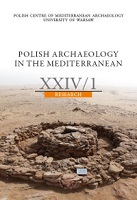PLANT MACROFOSSILS FROM THE SITE OF TELL ARBID,
NORTHEAST SYRIA (3RD–2ND MILLENNIUM BC). PRELIMINARY REPORT
PLANT MACROFOSSILS FROM THE SITE OF TELL ARBID,
NORTHEAST SYRIA (3RD–2ND MILLENNIUM BC). PRELIMINARY REPORT
Author(s): Aldona Mueller-Bieniek, Krystyna Wasylikowa, Anna SmogorzewskaSubject(s): Archaeology, Cultural history, Ancient World
Published by: Wydawnictwa Uniwersytetu Warszawskiego
Keywords: cereals; agriculture; pulses; Tell Arbid; Syria; Ninevite 5
Summary/Abstract: The paper presents preliminary results of an analysis of 51 samples of plant macrofossils coming from various archaeological contexts from the site of Tell Arbid in Northeast Syria. The contexts were dated mainly to the 3rd millennium BC (EJI–EJV) with a few being of 2nd millennium BC date (Khabur Ware and Mitanni periods). Cultivated plants were represented by cereals and pulses. The cultivation of at least three cereal species is documented, including a hulled variety of two-rowed barley, glumed einkorn and/or emmer wheat, and a species of naked wheat, probably macaroni wheat. Vegetables included lentil, bitter vetch, grass pea, and garden pea. Plants from the Ninevite 5 period (EJI–EJII) and their significance in the Tell Arbid economy are discussed in greater detail owing to the highest number of samples studied.
Journal: Polish Archaeology in the Mediterranean
- Issue Year: 1/2015
- Issue No: XXIV
- Page Range: 657-674
- Page Count: 18
- Language: English

